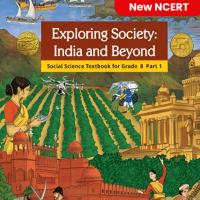Class 8 Exam > Class 8 Questions > What is a country?
Start Learning for Free
What is a country?
Most Upvoted Answer
What is a country?
What is a country?
A country is a geographical and political entity that is recognized by other countries and international organizations. It is a sovereign state that has a defined territory, a permanent population, and a government that has the power to make and enforce laws within the territory.
Defined Territory
A country has a defined territory, which is usually established by physical boundaries such as rivers, mountains, or man-made structures like fences or walls. The territory of a country is often defined by legal documents such as a constitution, treaty, or international agreement.
Permanent Population
A country has a permanent population of people who live within its territory. These people may be citizens of the country or residents who are not citizens but have legal permission to live and work in the country. The population may be diverse, with people of different ethnicities, languages, and cultures.
Government
A country has a government that has the power to make and enforce laws within its territory. The government may be a democracy, a monarchy, or another type of political system, but it must have the ability to exercise authority over its population and maintain order.
Recognition by Other Countries and International Organizations
A country is recognized by other countries and international organizations as a sovereign state. This means that other countries and organizations acknowledge the country's right to exist and conduct its own affairs without interference from outside forces.
Conclusion
In conclusion, a country is a sovereign state with a defined territory, a permanent population, and a government that has the power to make and enforce laws within its territory. It is recognized by other countries and international organizations as a political entity that has the right to exist and conduct its own affairs.
Community Answer
What is a country?
A place which has states and has prime minister or pesident at central level is called country

|
Explore Courses for Class 8 exam
|

|
Question Description
What is a country? for Class 8 2025 is part of Class 8 preparation. The Question and answers have been prepared according to the Class 8 exam syllabus. Information about What is a country? covers all topics & solutions for Class 8 2025 Exam. Find important definitions, questions, meanings, examples, exercises and tests below for What is a country?.
What is a country? for Class 8 2025 is part of Class 8 preparation. The Question and answers have been prepared according to the Class 8 exam syllabus. Information about What is a country? covers all topics & solutions for Class 8 2025 Exam. Find important definitions, questions, meanings, examples, exercises and tests below for What is a country?.
Solutions for What is a country? in English & in Hindi are available as part of our courses for Class 8.
Download more important topics, notes, lectures and mock test series for Class 8 Exam by signing up for free.
Here you can find the meaning of What is a country? defined & explained in the simplest way possible. Besides giving the explanation of
What is a country?, a detailed solution for What is a country? has been provided alongside types of What is a country? theory, EduRev gives you an
ample number of questions to practice What is a country? tests, examples and also practice Class 8 tests.

|
Explore Courses for Class 8 exam
|

|
Signup for Free!
Signup to see your scores go up within 7 days! Learn & Practice with 1000+ FREE Notes, Videos & Tests.


















